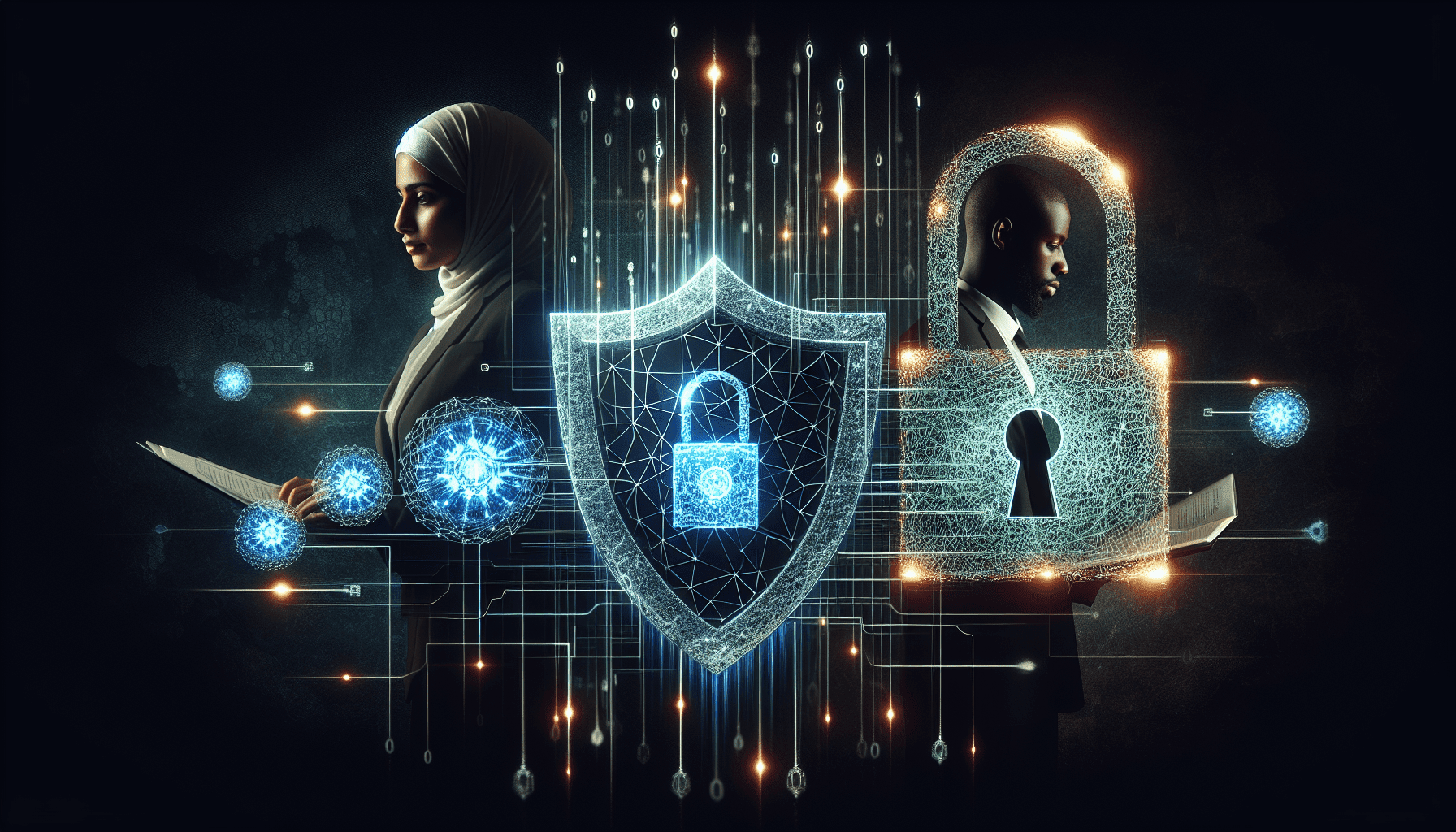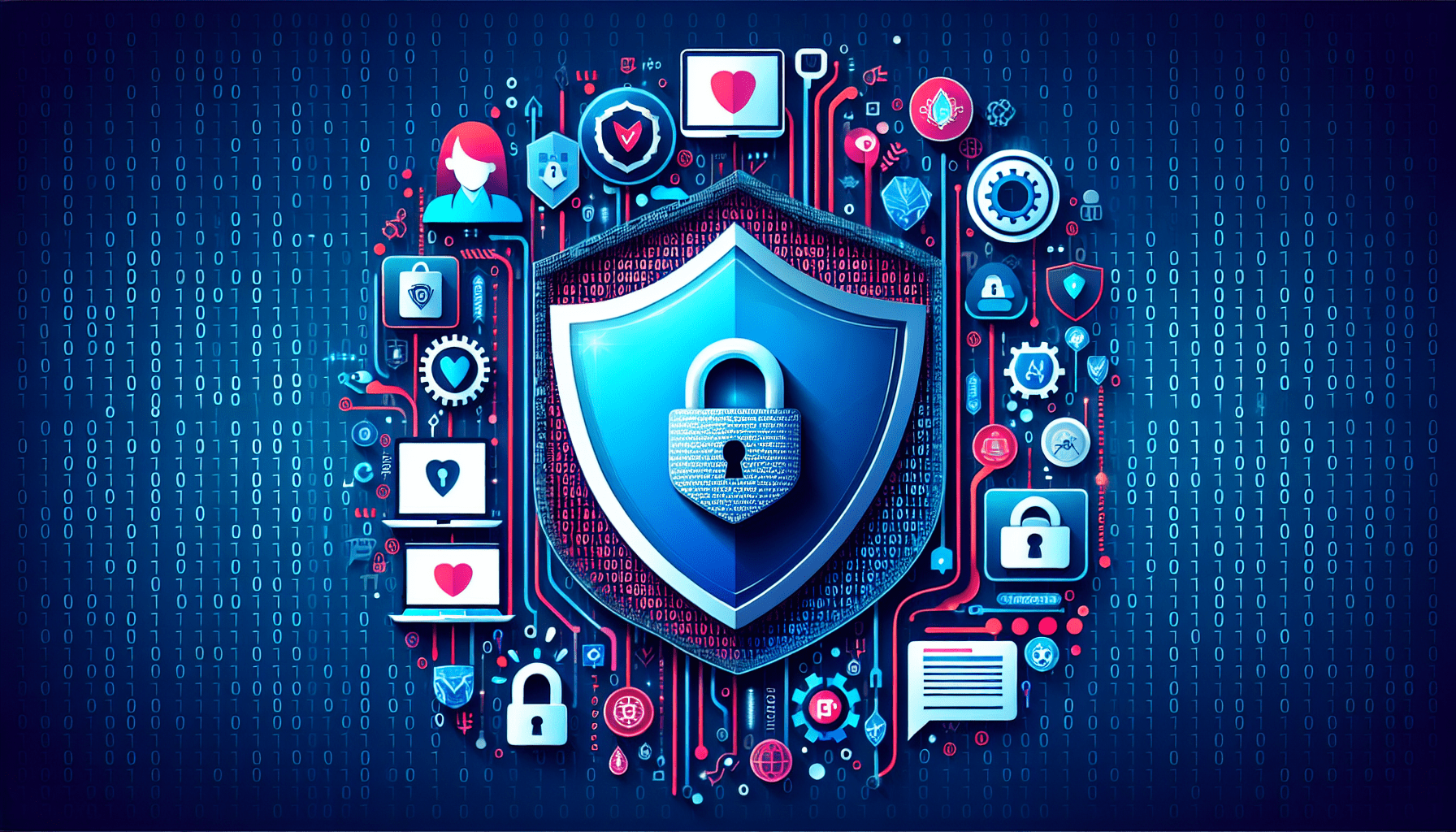In today’s digital age, ensuring your personal cybersecurity is more important than ever before. With cybercrimes on the rise and hackers becoming increasingly sophisticated, it’s crucial to equip yourself with the necessary knowledge and skills to protect your online identity. That’s where personal cybersecurity coaching comes in. Designed to empower individuals like you, this personalized coaching program offers practical guidance on securing your devices, safeguarding your personal information, and staying one step ahead of potential threats. By taking advantage of this invaluable resource, you’ll gain the confidence and expertise needed to navigate the digital landscape with peace of mind.
What is Personal Cybersecurity Coaching?
Definition
Personal cybersecurity coaching refers to the process of receiving guidance, support, and education on how to protect yourself from online threats and maintain a secure online presence. It involves working with a cybersecurity professional who provides personalized coaching to help you develop and implement effective security measures.
Importance
In today’s digital age, where we are constantly connected and rely on technology for various aspects of our lives, personal cybersecurity coaching has become increasingly important. With the prevalence of cyber threats such as hacks, data breaches, and identity theft, it is crucial for individuals to be proactive in protecting their personal and sensitive information.
Benefits
Engaging in personal cybersecurity coaching offers numerous benefits. Firstly, it enhances your knowledge and awareness of the various threats and vulnerabilities that exist online, empowering you to make informed decisions about your digital security. Additionally, it helps you develop the skills and best practices necessary to safeguard your online activities, ultimately leading to enhanced online safety. Personal cybersecurity coaching also provides protection against identity theft and financial loss, as well as helps in securing your personal and professional reputation.
Cybersecurity Threats
Types of Cybersecurity Threats
Cybersecurity threats come in various forms, each with its own objectives and methods. Common types of threats include malware, phishing attacks, ransomware, social engineering, and insider threats. Malware refers to malicious software that infects a computer system to gain unauthorized access or control over it. Phishing attacks involve tricking individuals into revealing sensitive information like passwords and credit card details. Ransomware encrypts a user’s files and demands a ransom for their release. Social engineering involves manipulating individuals into divulging confidential information. Insider threats occur when individuals with authorized access to systems use their privileges for malicious purposes.
Common Attack Vectors
Attack vectors are the methods or paths used by cybercriminals to carry out their attacks. Some common attack vectors include email attachments, infected websites, unsecured Wi-Fi networks, malicious links, and compromised software. Cybercriminals often exploit vulnerabilities in these areas to gain access to personal information or compromise computer systems.
Risks and Implications
The risks and implications of falling victim to cybersecurity threats are significant. These include identity theft, financial loss, damage to personal and professional reputation, loss of sensitive data, and disruption of services. Cyberattacks can have far-reaching consequences, not only for individuals but also for organizations and society as a whole. It is therefore crucial to take proactive measures to protect oneself and mitigate these risks.
The Role of Personal Cybersecurity Coaching
Overview of Coaching Process
Personal cybersecurity coaching typically involves an initial assessment to identify existing vulnerabilities and weaknesses. The coach then works with you to develop a personalized security plan tailored to your needs and goals. Throughout the coaching process, you will receive education, guidance, and support to enhance your knowledge of cybersecurity best practices and implement effective security measures.
Identifying Vulnerabilities and Weaknesses
One of the core aspects of personal cybersecurity coaching is identifying the vulnerabilities and weaknesses in your online practices and digital footprint. The coach will analyze your current security measures, examine your online activities and habits, and identify areas of potential risk. This assessment helps in understanding the specific areas where additional attention and improvement are needed.
Educating on Best Practices
Personal cybersecurity coaching aims to educate individuals on the best practices for maintaining online security. This includes guidance on creating strong and unique passwords, enabling two-factor authentication, regularly updating software, using secure internet connections, avoiding suspicious emails and links, practicing safe social media habits, protecting personal devices, and implementing data backup and recovery strategies. By providing this education, coaches empower individuals to make informed choices and take proactive steps to protect themselves online.
Creating Personalized Security Plans
A key deliverable of personal cybersecurity coaching is the creation and implementation of a personalized security plan. This plan is tailored to your specific needs, vulnerabilities, and goals. It serves as a roadmap for implementing security measures and acts as a guide for maintaining a secure online presence. The coach will work closely with you to develop a plan that combines practicality, effectiveness, and ease of implementation.
Finding a Personal Cybersecurity Coach
Qualifications and Expertise
When searching for a personal cybersecurity coach, it is important to consider their qualifications and expertise. Look for coaches who have relevant certifications and a strong background in cybersecurity. They should possess in-depth knowledge of the latest threats, trends, and technologies in the field. Additionally, consider coaches who actively engage in continuous professional development to stay abreast of evolving cybersecurity practices.
Reputation and Reviews
Another important factor to consider when choosing a personal cybersecurity coach is their reputation and reviews. Seek out coaches who have a track record of success in helping individuals improve their cybersecurity. Look for testimonials, reviews, and feedback from previous clients to gauge the coach’s effectiveness and reliability. A coach with a positive reputation and satisfied clients is more likely to provide a valuable coaching experience.
Approach and Methodology
Different coaches may have different approaches and methodologies for personal cybersecurity coaching. Some may focus on practical implementation, while others may emphasize education and awareness. Consider what approach aligns with your needs and preferences. Inquire about the coach’s coaching style, techniques, and strategies to ensure they match your expectations and learning style.
Confidentiality and Trust
Given the sensitive nature of personal cybersecurity coaching, confidentiality and trust are paramount. Ensure that the coach has a strict policy regarding the confidentiality of your personal information and any discussions that take place during the coaching sessions. It is important to feel comfortable sharing sensitive details with your coach, so establishing trust is crucial for a successful coaching relationship.
Benefits of Personal Cybersecurity Coaching
Increased Knowledge and Awareness
Personal cybersecurity coaching significantly enhances your knowledge and awareness of the threats and vulnerabilities that exist online. Through education and guidance, you gain a deep understanding of how cybercriminals operate, the various tactics they employ, and the impact their actions can have. This knowledge empowers you to make informed decisions regarding your online security.
Enhanced Online Safety
Engaging in personal cybersecurity coaching leads to enhanced online safety. You learn best practices and security measures to protect yourself from cyber threats. By implementing these measures, such as using strong passwords, enabling two-factor authentication, and practicing safe browsing habits, you significantly reduce the chances of falling victim to cybercriminals. This, in turn, improves your overall safety and security in the digital realm.
Protection against Identity Theft
Identity theft is one of the most detrimental cybercrimes, with far-reaching consequences for victims. Personal cybersecurity coaching provides you with the tools and knowledge to protect yourself against identity theft. By understanding how criminals gain access to personal information and implementing robust security measures, you minimize the risk of your identity being stolen.
Prevention of Financial Loss
Cyberattacks can result in significant financial loss for individuals. From unauthorized purchases and drained bank accounts to fraudulent credit card charges, the financial implications of falling victim to cybercrime can be devastating. Personal cybersecurity coaching helps you prevent financial loss by educating you on secure financial practices, teaching you how to spot and avoid scams, and guiding you on securing your financial information.
Securing Personal and Professional Reputation
In today’s interconnected world, our personal and professional reputations are closely tied to our online activities. A cyberattack or data breach can not only compromise our personal information but also tarnish our reputation. Personal cybersecurity coaching equips you with the knowledge and skills to secure your personal and professional information, ensuring that your reputation remains intact.
Personal Cybersecurity Tips and Strategies
Strong and Unique Passwords
Creating strong and unique passwords is a fundamental aspect of personal cybersecurity. Use a combination of uppercase and lowercase letters, numbers, and symbols. Avoid using easily guessed information, such as your name or birthdate, and avoid using the same password for multiple accounts.
Two-Factor Authentication
Enable two-factor authentication whenever possible. This adds an extra layer of security by requiring a secondary form of verification, such as a code sent to your smartphone, in addition to your password. It significantly reduces the risk of unauthorized access to your accounts.
Regular Software Updates
Regularly update your software, including operating systems, web browsers, and applications. Software updates often include patches for security vulnerabilities and help protect you from new threats. Enable automatic updates whenever possible to ensure you stay protected.
Secure Internet Connection
Use secure internet connections, especially when accessing sensitive information or making online transactions. Avoid using public Wi-Fi networks, as they are often unsecured and can be easily intercepted by hackers. Instead, use a trusted and password-protected network or consider using a virtual private network (VPN) for added security.
Avoiding Suspicious Emails and Links
Be cautious when opening emails from unknown sources or clicking on suspicious links. Phishing attacks often come in the form of emails that appear to be from legitimate sources but are designed to trick you into revealing sensitive information. Be vigilant and verify the authenticity of emails and links before taking any action.
Safe Social Media Practices
Practice safe social media habits by adjusting your privacy settings to control who can see your posts and personal information. Be mindful of what you share online, as cybercriminals can use this information for malicious purposes. Avoid accepting friend requests from unknown individuals and be cautious of sharing personal details publicly.
Protecting Personal Devices
Take steps to protect your personal devices, such as smartphones, laptops, and tablets. Enable passcodes or biometric authentication to prevent unauthorized access. Install reputable antivirus software and regularly scan your devices for malware. Be cautious when downloading apps or software from untrusted sources.
Data Backup and Recovery
Regularly backup your important data to ensure you can recover it in the event of a cyberattack or system failure. Use external hard drives or cloud storage services to securely store your data. Test your backups periodically to ensure they are working properly.
Challenges in Implementing Personal Cybersecurity
Resistance to Change
One of the main challenges in implementing personal cybersecurity practices is resistance to change. Many individuals may be resistant to adopting new security measures or changing their online habits, either due to complacency or a lack of understanding of the risks involved. Overcoming this resistance requires education, awareness, and a commitment to personal security.
Difficulty in Maintaining Vigilance
Maintaining cybersecurity vigilance can be challenging, especially in a world where technology is constantly evolving. It requires staying up to date with the latest threats and security practices. Additionally, individuals may become complacent over time, assuming that their existing security measures are sufficient. Personal cybersecurity coaching helps individuals maintain vigilance by providing ongoing education and support.
Balancing Convenience and Security
Balancing convenience and security is another challenge in personal cybersecurity. Many security measures, such as complex passwords or multi-factor authentication, can be inconvenient and time-consuming. Individuals may be tempted to prioritize convenience over security, putting themselves at risk. Coaches can help strike a balance by providing strategies and solutions that prioritize both convenience and security.
Keeping Up with Evolving Threat Landscape
The threat landscape in the cybersecurity world is constantly evolving. New threats and attack vectors emerge regularly, requiring individuals to stay informed and adapt their security practices accordingly. Personal cybersecurity coaching helps individuals stay up to date with the latest threats and provides strategies for adapting to the changing landscape.
Measuring Personal Cybersecurity Success
Reduction in Security Incidents
One indicator of personal cybersecurity success is a reduction in the number of security incidents experienced. By implementing best practices and security measures, individuals can significantly decrease their susceptibility to cyber attacks. A decrease in security incidents demonstrates that individuals are successfully protecting themselves against online threats.
Improved User Behavior
Measuring personal cybersecurity success also involves assessing user behavior. Successful coaching results in individuals adopting safer online practices, such as regularly updating software, using secure passwords, and being cautious of suspicious emails and links. By observing improved user behavior, it can be inferred that personal cybersecurity coaching has been successful.
Positive Feedback and Testimonials
Positive feedback and testimonials from clients are another indicator of personal cybersecurity success. Satisfied clients who have benefited from coaching are likely to share their positive experiences. Testimonials provide reassurance that the coaching has had a significant impact and has been effective in improving personal cybersecurity.
Reduced Impact and Recovery Time from Attacks
In the unfortunate event of a cybersecurity incident, the impact and recovery time can be indicative of personal cybersecurity success. Individuals who have implemented effective security measures are more likely to experience less severe consequences from attacks. Additionally, they should be able to recover and restore their online presence more efficiently, minimizing the disruption caused by the attack.

Evolving Cybersecurity Trends and Technologies
Artificial Intelligence and Machine Learning
Artificial intelligence (AI) and machine learning (ML) are revolutionizing the field of cybersecurity. AI-powered systems can analyze vast amounts of data and identify patterns indicative of cyber threats. ML algorithms can adapt to new and evolving threats, making them valuable tools in combating cybercrime.
Behavioral Analytics
Behavioral analytics is another emerging trend in cybersecurity. By analyzing user behavior patterns, such as browsing habits, login locations, and device usage, behavioral analytics can detect anomalies and identify potential security threats. This proactive approach to cybersecurity enables early detection and prevention of attacks.
Internet of Things (IoT) Security
With the increasing prevalence of IoT devices, securing these interconnected devices is crucial. IoT security involves implementing measures to protect devices such as smart home appliances, wearables, and connected vehicles from cyber threats. Personal cybersecurity coaching educates individuals on the importance of securing IoT devices and provides strategies for maintaining their security.
Biometric Authentication
Biometric authentication, such as fingerprint or facial recognition, offers a more secure alternative to traditional password-based authentication. Personal cybersecurity coaching can help individuals navigate the complexities of biometric authentication and understand its benefits and limitations.
Blockchain Technology
Blockchain technology has the potential to revolutionize cybersecurity by providing a decentralized and tamper-proof system for storing and verifying data. Personal cybersecurity coaching can help individuals understand the implications and applications of blockchain technology in securing their digital presence.
Conclusion
In an increasingly digital world, personal cybersecurity coaching plays a vital role in protecting individuals from the ever-present threats online. By educating individuals, identifying vulnerabilities, and providing personalized security plans, personal cybersecurity coaching empowers individuals to take control of their online safety. Through the adoption of best practices, individuals can mitigate the risks associated with cyber threats, safeguard their personal information, and maintain a secure online presence. With the help of a trusted personal cybersecurity coach, you can navigate the complexities of the digital landscape with confidence and peace of mind. Stay safe, stay informed, and protect your digital life with personal cybersecurity coaching.





